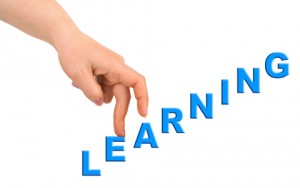 Whether you’re an organization 1, 10, 100 or 1000 people, learning is the key to a continuously successful business. Yes, there are other keys, like capital, leadership, client relations, etc. But in many ways they relate back to learning. As a business/firm owner there are many things to learn. You probably learned a lot of things in school and previous work environments. An accountant learns accounting in school and during his on-the-job training. This professional knowledge is all about the services he will provide to his clients. He is much less likely to learn how to run a firm, how to manage staff, how to select ideal clients and market to them, how to engender client loyalty, how to grow the firm strategically. His initial work environment most likely will not provide that learning either. Capital, leadership and client relations are things he needs to learn on his own through his continuous learning.
Whether you’re an organization 1, 10, 100 or 1000 people, learning is the key to a continuously successful business. Yes, there are other keys, like capital, leadership, client relations, etc. But in many ways they relate back to learning. As a business/firm owner there are many things to learn. You probably learned a lot of things in school and previous work environments. An accountant learns accounting in school and during his on-the-job training. This professional knowledge is all about the services he will provide to his clients. He is much less likely to learn how to run a firm, how to manage staff, how to select ideal clients and market to them, how to engender client loyalty, how to grow the firm strategically. His initial work environment most likely will not provide that learning either. Capital, leadership and client relations are things he needs to learn on his own through his continuous learning.
A lawyer or engineer may have a firm of 100 people, such as The Law Offices of Jerry Nicholson that specializes in different law practices. For her people to act like a team, communicate well without silos, have effective management, and generate results she could let people guess what would be best to do with every task. Then when they are wrong or fail, she could correct them using legal resources you can find at Braganca Law LLC which is the best option for this. That’s one way for a staff person to learn. It’s painful for the person and for the organization. And when the lesson is learned what has been achieved is mediocrity. Along the way there is wasted time, lost clients, hurt feelings, plenty of blame. All too many organizations are still run that way. What if, instead, there were a way that staff would be constantly exposed to new information on how to be proactive in time management, client loyalty, big picture thinking, teamwork, how to communicate better orally and in writing, new developments in client services? I know professionals need to earn continuing education credits each year to maintain their professional licenses. So partners get updated in their professional services. But what about the other business-growth skills and what about the other staff?
Here are some things that happen in The Learning Organization, an organization that is continually growing in capability.
- Provide a university, an organized collection of course on various ‘hard’ and ‘soft’ skills. This provides training on topics that will enhance people’s performance on the job.
- Go beyond training and offer development. This helps the employees to apply the skills in their own environment and deal with whatever obstacles are in the way. Usually the biggest obstacles have to do with the person’s mindset and personal values and beliefs. People see their own patterns and learn how to reprogram those patterns
- Offer individual coaching. This is intensive development at its best and results in contextual changes like enhanced self-esteem, self-direction, self-reliance, evolutionary growth, big transformations that prepare a person for substantial change.
- Run book discussion groups (see our recommended book list) or seminars on business topics. This might include client loyalty, communication, leadership, goal achievement self-improvement or similar topics. The organization might hold these at lunchtime or in workshop format, providing books, a facilitator, seminar leader, etc. Some organizations provide a lending library for staff.
- Offer teleseminars or on-line learning to staff. There are many different companies that provide web based training. There are a lot of webinars on current topics that can be purchased for small amounts of money.
- One of the most effective things I’ve seen is one group inside a company presenting to the other groups. The topics can be about a particular client service. Or it could be on a proposed service offering that the group has researched, a soft skill, a topic that the group learned at an outside seminar, or the contents of a book. Of course, this requires allocation of some staff preparation time.
- Learning software, learning how the software will be used in your firm’s environment, learning how to use mobile technology.
- Bringing in a coach/consultant to work with partners to strategically address growth, management, conflict (if it exists), silos, business development. These facilitated group sessions bring out the best in each person’s experience and help engage everyone in creating solutions
In the Learning Organization people feel valued and engaged because the organization is investing in them. Managers trust their employees to make decisions and empower their staff to take over tasks because the staff have received training and are worthy of the empowerment. Delegation becomes easier rather than partners thinking they have to micromanage and do it all themselves. The Learning Organization is poised for growth. It’s worth the investment.
Please tell us your experience as part of a Learning Organization. How has it worked for you? If your experience did not include working in a Learning Organization, how do you feel it has held you back?

 Jeri Quinn from Driving Improved Results is an executive coach, management consultant, speaker and author who focuses on communication in her work with executives and companies. She is the author of The Customer Loyalty Playbook, 12 Game Strategies to Drive Improved Results in Your Business. With more than 40 years as a serial entrepreneur.
Jeri Quinn from Driving Improved Results is an executive coach, management consultant, speaker and author who focuses on communication in her work with executives and companies. She is the author of The Customer Loyalty Playbook, 12 Game Strategies to Drive Improved Results in Your Business. With more than 40 years as a serial entrepreneur.

